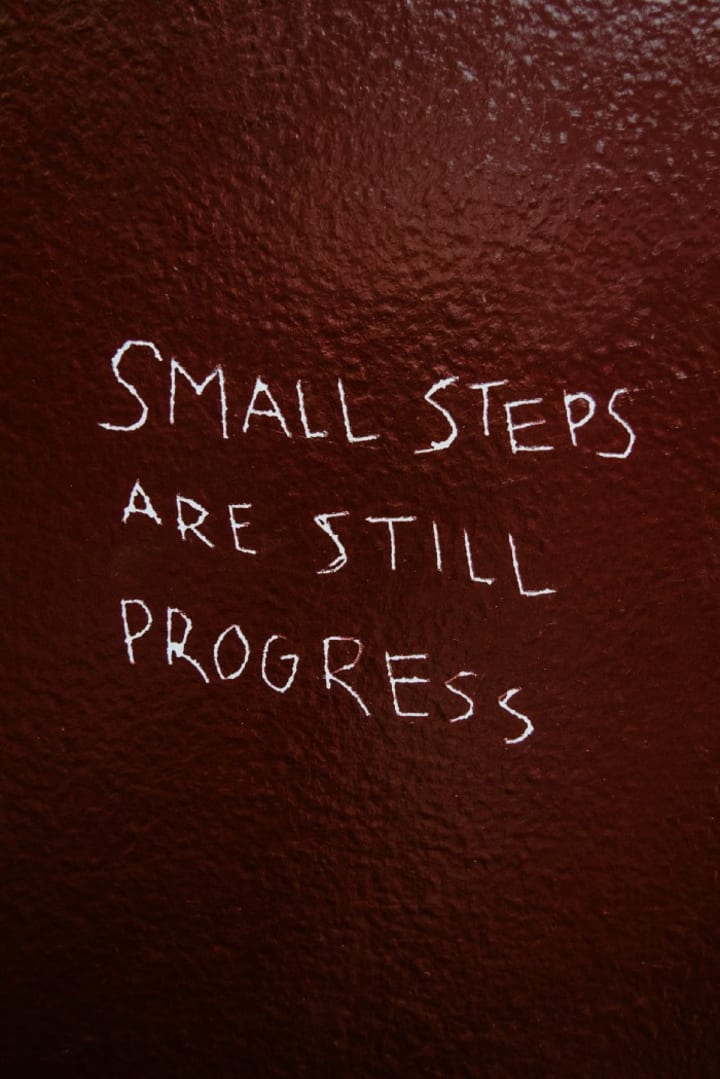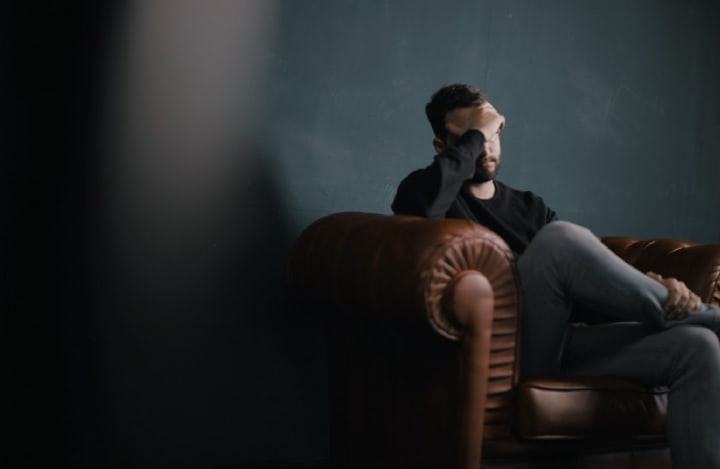Living In Grief Town Or Moving Forward
Leaving Grieftown is our choice and ours alone.

Grieving is the feeling of grief for or because of a loss in one's life. It’s a transitive verb in the English language. Webster’s Dictionary defines grieving as,
: to cause to suffer: Distress//it grieves me to see him this way
: to feel or show grief over //grieving the death of her son
: to submit a formal grievance concerning //grieve a dismissal
1 and 2 are the kind of grief we don’t always understand. The effects of grieving are harsh, painful, and felt differently by everyone. They can cripple a person's growth.
One of our long-time family friends once lost a daughter at a young age. She was only 25 or 26 when she died. His grief affected him deeply enough that he lost the will to live.
Many of the people that we encounter are dealing with grief. We seldom know when someone is grieving because they don’t share with us how they feel. Maybe you’ve had this discussion.
You: “How are you doing?”
Them: “I’m alright?”
Are they alright? Have you taken the time to take a long and hard look at that person? In our circles, we will have friends, colleagues, and loved ones that experience grief. They’re dealing with demons that they sometimes can’t shake.

Grief’s Effects On Our Health
Unshakable grief has a long-term effect on our health and well-being. It causes us to act in ways that are against our self-interests. We stop eating right or don’t eat at all. Some turn to alcohol and other chemicals, trying to numb the pain inside them.
People carry grief with them. It changes who they are and their outward look at life. While they may put on a smile for the ones they love, that grief is secretly eating them up inside, becoming another demon they have to face.
Long-term, the overall effect grief has on things like sleeping, focus, and productivity doesn’t go unnoticed. People articulate their reasons for change as a slump, having not gotten much sleep, or going through some personal things. Personal things, that’s the red flag. That’s a sign that the person needs to talk.
When we look at every problem as a “personal” problem, we begin internalizing every struggle. Grieving is personal, but everyone has gone through grieving something. Internalizing all of your grief can have a long and lasting, negative effect, on your mental health.
The last time I went through grief, I was given suggestions by a mental health professional. It’s almost funny that the suggestions were the same ones given by the two people that knew my situation.
- Take a walk
- Do something you used to enjoy
- Don’t isolate yourself
- Work out
- Cover the basics, like eating, sleeping, and self-care
- Don’t spend too much time grieving

Things Must Progress
Even the process of grieving must progress. When grieving takes over our lives things in our lives begin to suffer, like relationships, jobs, friendships, and our family responsibilities. It becomes inevitable when we become so distracted by pain, suffering, loss, and grief.
How to progress is an arguable point. Some people need to seek professional assistance, others slowly pull out of that low point in their lives, and others learn to deal with the loss, moving on as partially functional people. Grief can cause a person to lose something in life.
Moving on and making progress is easier to say than they are to do. The grief of a divorce, for instance, is sometimes enough to render a person unable to move on. People aren’t meant to live solitary lives. However, what happens when the trauma and heartache are so intense that they sour a person’s ability to trust, to open themselves up to again experiencing love.
Years ago, when I was a young supervising officer at a police agency, I met a woman a work that was in her 60s and had been single since her 30s. She’d met the “love of her life,” when she was young, got married, had kids, and had a fairy tale life. That was until her husband cheated on her, ultimately leaving her for another woman.
The grief of that experience lingered in her life. It had changed her. We talked about marriage and relationships. She cautioned that carrying around the pain of that betrayal can keep a person from knowing what’s possible. She was right. The grief from divorce can leave a person unable to move on in their personal lives. Grief caused by other reasons can have the same effect if we don’t move on and learn how to live again.

The Worst Grieving Imaginable
Things that we grieve affect us on personal levels. Whether it’s the loss of a job, the loss of a friend, the loss of a pet, the loss of a loved one, or something unimaginable, it affects us all differently. We may imagine that what we’re dealing with is the worst thing in the world. It’s important to take stock of what others have suffered.
In 2007, by surprise, I lost my mother to a stroke. This came just 5 years after the passing of my grandfather. Then, barely 3 years later, my father. I spent a fair amount of time grieving. My father’s death hit me the hardest, and I made some judgment calls that were questionable during the period afterward.
In 2014, when I was an officer, I was the victim of an ambush-style attack. It was because I was an officer and the attacker made no secret of the fact that being white was part of his reason for the attack. For a while, I grieved. It wasn’t the attack. It was the aftermath of the attack.
Faced with problems dealing with the attack, I was sent to counseling. Counselors are what they are, there to help you deal with your life and recognize where you’ve got problems. Going to counseling came with one more consequence of the attack I’d suffered.
Counselors dig into a person's psyche, trying to determine where they have unresolved issues, and mine found one. Mine found an issue I wasn’t aware of and brought it to the surface. On my 5th concussion, it was like something inside me was knocked loose. Suddenly, in the middle of a counseling session, repressed memories came to the surface.
It was at that moment that I lost something from my life. Fond memories of those that leave this world are important. So, when you lose fondness for a passed loved one, like a mother, the grieving process starts over. Now, I found myself grieving because of something done to me as a small child.

It was a startling revelation and something I’d never given much thought to when growing up. I had no reason to believe that something like this could have happened to me. And, like a lot of kids, I’d chosen not to remember what I suffered.
Having had more memories that were good than the bad ones, I chose forgiveness. I couldn’t carry that around with me without it affecting my life. It took some time, but ultimately it was the choice I came to make. It was the right choice.
Conclusion
None of us are alone when we grieve. We don’t have to be. We have to find the strength and the courage to talk to a friend, talk to a loved one, or talk to a professional. It’s something that we owe to ourselves when we’re in pain. Taking care of ourselves helps us to take care of the people in our lives. What good are we to anyone if we aren’t O.K.?
Whether you choose to see someone professionally or to go it alone, is a personal decision. If you go it alone, remember to keep yourself moving and do the things that you love. Take care of your health, get plenty of sleep, and know that it’s alright if you’re not perfect for a while. You can get there.
**********************************************************************
Thanks for reading my story. If you enjoyed it and want to show your support, leave a heart or even a tip if you feel compelled. If you're interested in sharing your story and perhaps starting your journey as a writer, check out the Vocal link down below. It's only $9.99 a month and your membership supports the writers on the platform as well as makes you eligible to enter writing contests worth as much as $20,000 in prizes. As an Ambassador I would get a small benefit from you joining but your price never changes and you can cancel at any time.
About the Creator
Jason Ray Morton
I have always enjoyed writing and exploring new ideas, new beliefs, and the dreams that rattle around inside my head. I have enjoyed the current state of science, human progress, fantasy and existence and write about them when I can.






Comments
There are no comments for this story
Be the first to respond and start the conversation.